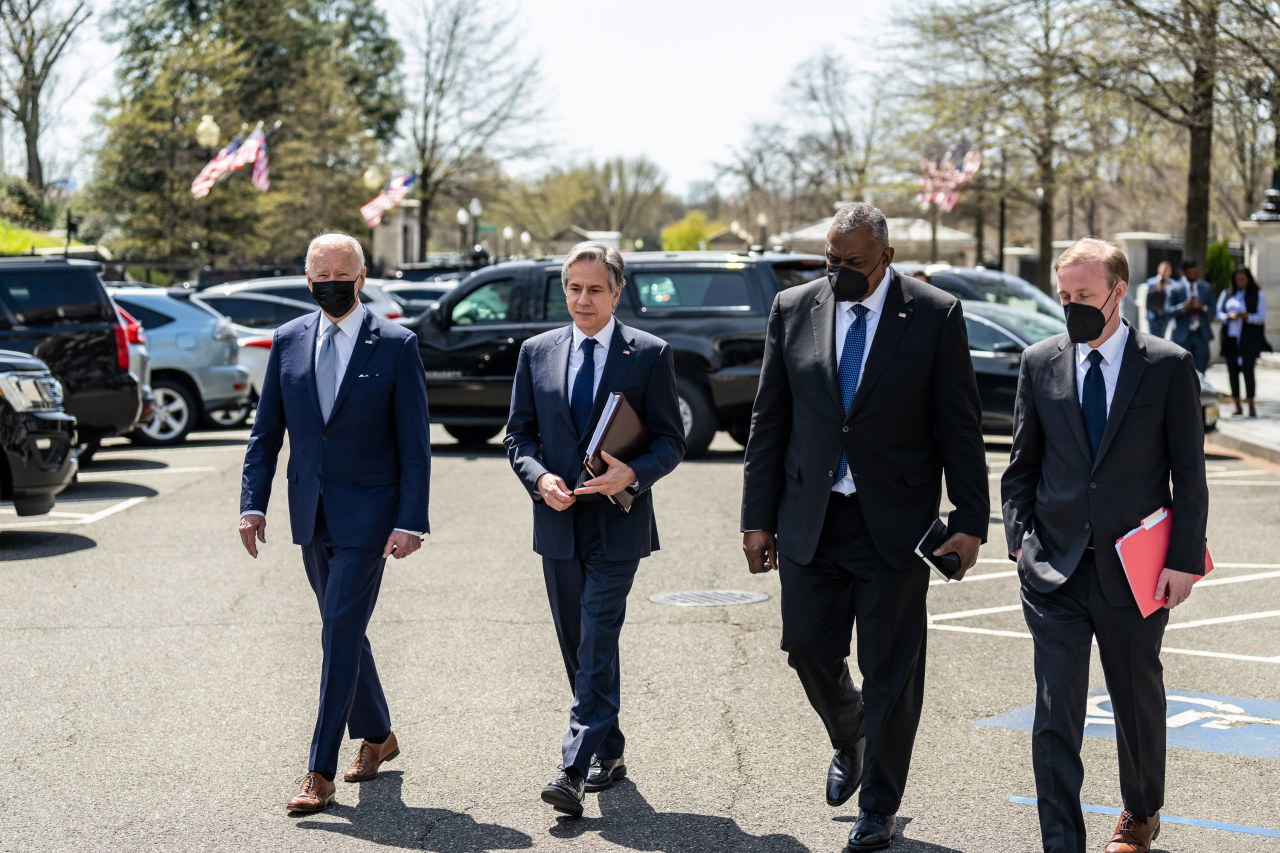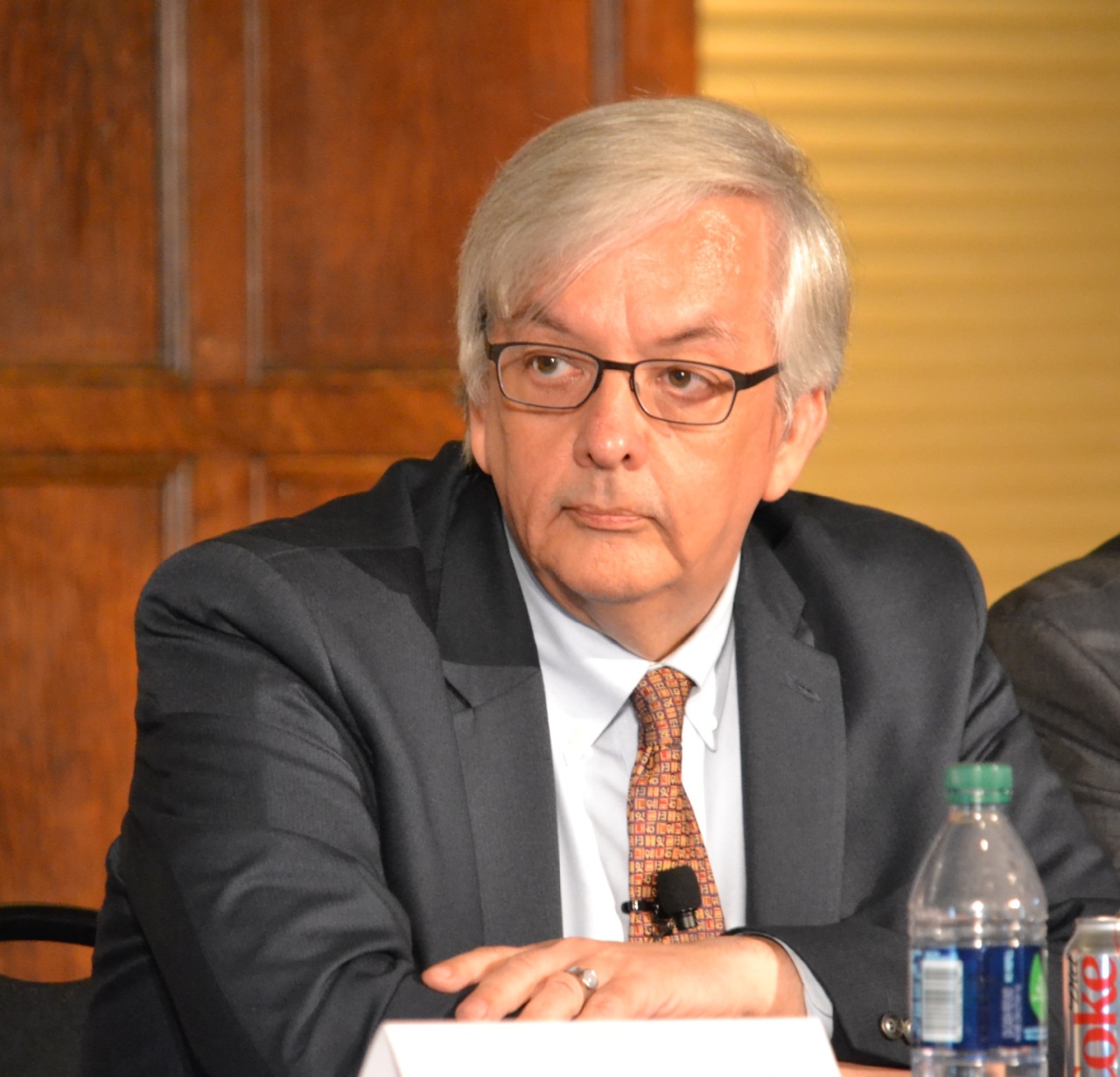 |
President Joe Biden walks with Defense Secretary Lloyd Austin, Secretary of State Antony Blinken and National Security Adviser Jake Sullivan across West Executive Avenue at the White House, Monday, April 11, 2022, en route to the West Wing. (Official White House Photo by Adam Schultz) |
“At this point, the ball really is in North Korea’s court. The US and South Korea have shown what they’re prepared to offer,” said Mark Tokola, vice president of the Korea Economic Institute of America, in an interview with The Korea Herald on Nov. 1. “But there are some things we could do that we haven’t done.”
The former US foreign service official who was stationed in Seoul from August 2009 to July 2012 suggested that the US could hold conventional arms talks with the two Koreas to defuse tensions on the Korean Peninsula, forge a new format of multilateral negotiating framework or, most importantly, start with an economic dialogue.
The suggestions came as Pyongyang has been unresponsive to the Biden administration’s repeated public and private overtures to “meet without preconditions,” while accelerating its military buildup and continuing nuclear saber-rattling.
At first, the three parties -- the US and two Koreas -- according to Tokola, could negotiate on levels and locations of armaments including artillery, missiles, helicopters and tanks, as well as seek “military-to-military dialogue and mutual observation of exercises” by holding conventional arms talks.
“Even if the results were modest, this might be one way to reduce tensions on the peninsula apart from talks on denuclearization. Conventional arms talks between NATO and the Warsaw Pact reduced tensions in Europe and might serve as a model,” he added, referring to the 1992 Treaty on Conventional Armed Forces in Europe.
Notwithstanding North Korea’s stubborn adherence to nuclear weapons, the US could seek to hold different types of multilateral negotiations with different parties involved from the past.
“We could get other countries involved. I’m not sure we’ve tried enough to bring in other players. North Korea is unwilling to talk to South Korea and the United States, (but) maybe they talk to Mongolia, European Union, Switzerland ... and Vietnam,” Tokola said. “North Korea could have a new approach. So, getting more players involved could assist.”
For instance, Mongolia has been considered a key potential mediator in light of its relatively amicable relations with the two Koreas, the US, China, Russia and Japan, and its successful and peaceful transition from a communist state to a democracy. North Korean state media in September also reported that Mongolian President Ukhnaagiin Khurelsukh invited North Korean leader Kim Jong-un to visit Mongolia at his convenience.
“There is an argument for including Mongolia in this possible six-party framework. It is in the region, after all, and as a mineral-rich country bordering China, is situated similarly to North Korea.”
Tokola also suggested that negotiations to pursue North Korea’s signing of the Chemical Weapons Convention -- which aims to eliminate an entire category of weapons of mass destruction -- could be an important stepping-stone to a nuclear-free Korean Peninsula.
Three UN member states -- Egypt, North Korea and South Sudan -- have neither signed nor ratified the multilateral treaty that entered into force in 1997.
“I think it’s probably as important or maybe more important than conventional arms talks with North Korea,” Tokola said. “It’s not difficult to sign because so many countries have. If we tried to urge a lot with South Korea and China for North Korea to sign the Chemical Weapons Convention, that would be a good step towards reducing tensions.”
Tokola said, however, the “idea of a multilateral negotiating framework should be considered as a possibility” although Russia’s armed invasion of Ukraine has made it impossible to revive the Six-Party Talks.
 |
Mark Tokola, vice president of the Korea Economic Institute of America (Korea Economic Institute of America) |
“The economic offers to North Korea are generally good, but we could be more specific,” he said. “We could talk about trying to help them join the World Bank or the IMF (International Monetary Fund). So there are different topics we could discuss.”
In the US-North Korea Agreed Framework signed in 1994, North Korea agreed to freeze operations and construction of its nuclear reactors in return for a package of economic, energy and diplomatic benefits from the US, including construction of light-water reactor power plants. But the deal failed.
Tokola underscored that the US should make specific proposals to help the Kim Jong-un regime fix systemic flaws in its economic system or carry on economic reform.
“It’s going to be more than just offering them food or offering them something substantial. I think it needs to be kind of systematic or reform-minded,” he said. “If that was accelerated to help North Korea more with property law or commercial law or things they can actually use to develop economically, that could provide some kind of opening.”
Tokola viewed that the Kim regime still seeks economic reform, despite current steps backward in the goal and old-fashioned ways to renew industries and revitalize the faltering economy.
The North Korean leadership is aware of systemic problems in its economy “which is fundamentally broken,” but it has not figured out how to fix the problems that have aggravated the economic backwardness.
“Kim Jong-un’s long-term survival depends on the North Korean economy succeeding. He told his own people that ‘you judge the North Korean state by whether it makes your lives better,’” Tokola said. “Well, it’s not right now, but I think it’s probably more important than the nuclear side in the interim.”
But North Korean leader Kim Jong-un publicly underscored that his country will never give up on nuclear weapons, and therefore “there will be absolutely no denuclearization first and no negotiation to that end” in his key policy speech in September.
------
The Korea Herald conducted a series of interviews with former senior US officials and experts in Washington from Oct. 31 to Nov. 2 on the occasion of the 54th South Korea-US Security Consultative Meeting. This is the last in a series of interviews. -- Ed.







